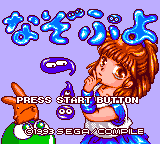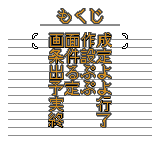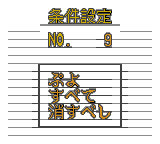Difference between revisions of "Nazo Puyo"
From Sega Retro
| Line 11: | Line 11: | ||
| gg_rrp_jp=15,800 | | gg_rrp_jp=15,800 | ||
| gg_code_jp=G-3224 | | gg_code_jp=G-3224 | ||
| + | }} | ||
| + | {{releases3DS | ||
| + | | vc3ds_date_jp=2013-09-25 | ||
| + | | vc3ds_rrp_jp=286 (''300'') | ||
}} | }} | ||
| genre=Puzzle | | genre=Puzzle | ||
| + | | cero=a | ||
}} | }} | ||
| − | '''''Nazo Puyo''''' (なぞぷよ) is a 1993 game for the [[Sega Game Gear]] by [[Compile]] spinning off ''[[Puyo Puyo]]''. It was released exclusively in bundles with specially marked Game Gears in Japan (hence its price tag) and would go on to receive two sequels on the Game Gear ([[Nazo Puyo Arle no Roux|the latter]] receiving two sequels on the Super Nintendo Entertainment System) and many PC-98 games (one retail, the others as part of the ''DiscStation'' series) and would be retooled as the Puzzle Mode of the 8-bit version of ''[[ | + | '''''Nazo Puyo''''' (なぞぷよ) is a 1993 game for the [[Sega Game Gear]] by [[Compile]] spinning off ''[[Puyo Puyo]]''. It was released exclusively in bundles with specially marked Game Gears in Japan (hence its price tag) and would go on to receive two sequels on the Game Gear ([[Nazo Puyo Arle no Roux|the latter]] receiving two sequels on the Super Nintendo Entertainment System) and many PC-98 games (one retail, the others as part of the ''DiscStation'' series) and would be retooled as the Puzzle Mode of the 8-bit version of ''[[Dr. Robotnik's Mean Bean Machine (8-bit)|Dr. Robotnik's Mean Bean Machine]]''. |
==Gameplay== | ==Gameplay== | ||
| Line 68: | Line 73: | ||
| cart=NazoPuyo GG JP Cart.jpg | | cart=NazoPuyo GG JP Cart.jpg | ||
}} | }} | ||
| + | |||
| + | ==External links== | ||
| + | * [http://vc.sega.jp/3ds/nazopuyo/ Sega of Japan VC catalogue page (Japanese)] | ||
{{Clear}} | {{Clear}} | ||
{{PuyoPuyo}} | {{PuyoPuyo}} | ||
Revision as of 16:32, 18 January 2015
This short article is in need of work. You can help Sega Retro by adding to it.
| Nazo Puyo | ||||||||||
|---|---|---|---|---|---|---|---|---|---|---|
| System(s): Sega Game Gear | ||||||||||
| Publisher: Sega | ||||||||||
| Developer: Compile | ||||||||||
| Genre: Puzzle | ||||||||||
| ||||||||||
|
CERO
Missing Parameter! |
Nazo Puyo (なぞぷよ) is a 1993 game for the Sega Game Gear by Compile spinning off Puyo Puyo. It was released exclusively in bundles with specially marked Game Gears in Japan (hence its price tag) and would go on to receive two sequels on the Game Gear (the latter receiving two sequels on the Super Nintendo Entertainment System) and many PC-98 games (one retail, the others as part of the DiscStation series) and would be retooled as the Puzzle Mode of the 8-bit version of Dr. Robotnik's Mean Bean Machine.
Gameplay
Nazo Puyo is basically the Mission Mode from the original MSX Puyo Puyo separated into its own game. There are two modes to play: Nazo Puyo, or Quest Mode (the main game), and a puzzle creator.
In Quest Mode, you are given a challenge and then a field that may or may not already have puyo in it. You must complete the challenge in the minimum number of puyo necessary. If you fail to, the game will generate a random string of puyo which will never allow you to complete the mission again, requiring you to either fill the screen or give up ( START ). Otherwise, controls are the same as Puyo Puyo.
If a field has puyo in it that are not all on the ground, or four or more puyo of the same color connected, you will be able to position one pair of puyo before they all fall down/are removed. This will be essential to completing such missions.
The puzzle creator allows you to make your own Nazo Puyo puzzles. Making puzzles requires navigating several screens through a menu (shown at right). The first screen lets you lay out the initial board; ![]() places a puyo, holding
places a puyo, holding ![]() and moving the D-pad selects a puyo to place from the right. The second screen chooses a puzzle:
and moving the D-pad selects a puyo to place from the right. The second screen chooses a puzzle: ![]() and
and ![]() change the puzzle,
change the puzzle, ![]() and
and ![]() increase the number/changes the color, and
increase the number/changes the color, and ![]() /
/![]() make a selection. The third screen chooses which colors of puyo will show up;
make a selection. The third screen chooses which colors of puyo will show up; ![]() /
/![]() toggle. The fourth screen chooses the pairs of puyo that fall — controls are the same as those of the first screen, and after the eight one, the game will give two random colors. The fifth screen is the actual puzzle; the sixth returns to the main menu.
toggle. The fourth screen chooses the pairs of puyo that fall — controls are the same as those of the first screen, and after the eight one, the game will give two random colors. The fifth screen is the actual puzzle; the sixth returns to the main menu.










